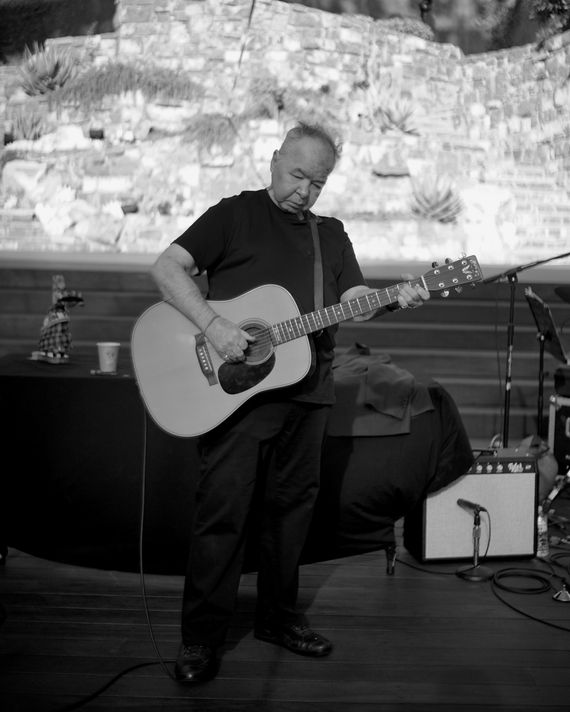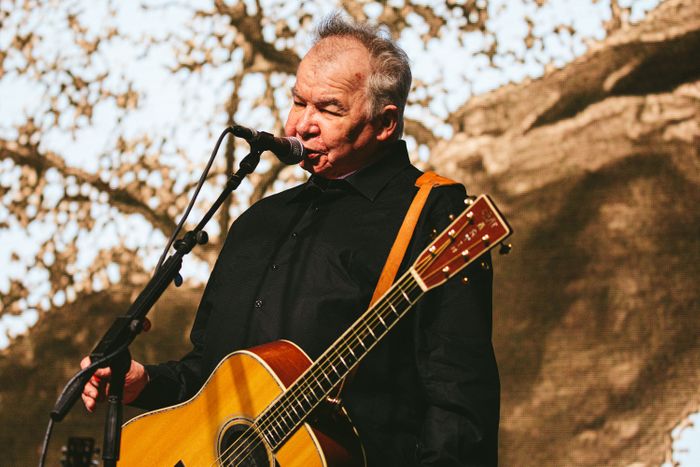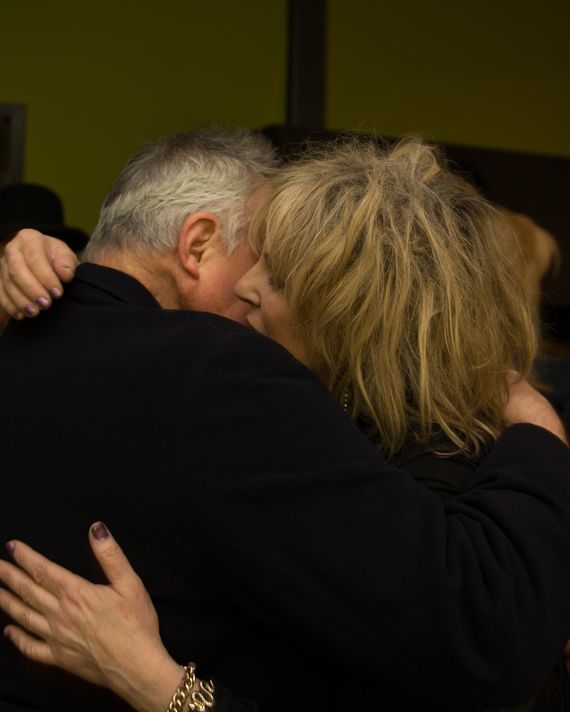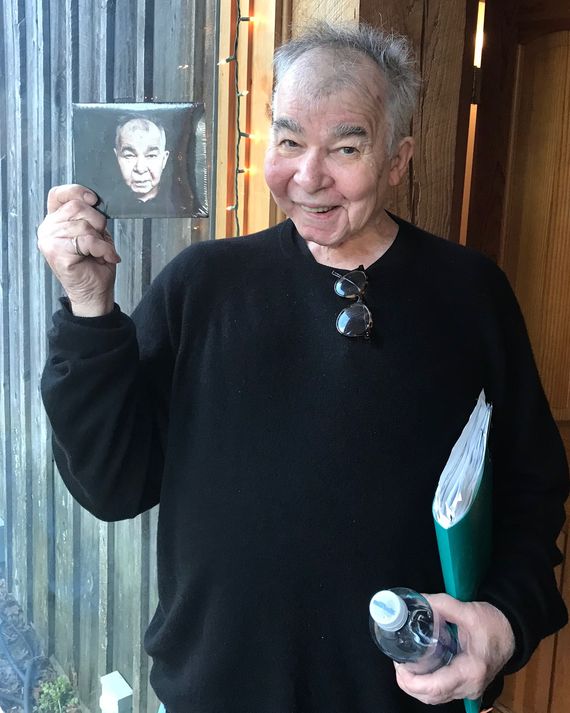
When John Prine lost his life to complications from COVID-19 on April 7, he went quickly — almost overnight. His wife and manager, Fiona, had contracted the disease in March following a European tour, but won her fight. Prine was hospitalized in intensive care for 13 days, but it seemed like the 73-year-old was going to pull through like he always did (Prine had previously beat cancer twice). Fiona tweeted on March 30 that John was stable, but quick to note that, as there is currently no cure for COVID-19, stable is not the same as improving. Still, it was hope; eight days later, though, he was gone. For his family, fans, and fellow songwriters, Prine’s death — like all victims of this pandemic — wasn’t just unfair but plain wrong: This wasn’t the proper end to John’s story.
For five decades, Prine was a songwriter’s songwriter who never lost touch with the common man. From his roots as a mailman in Maywood, Illinois, to becoming a two-time Grammy-winning, Nashville Hall of Fame legend, John remained quiet and humble, working directly with family and friends at his Oh Boy record label in Nashville. While John’s life revolved around simple joys — Christmas, oysters, classic cars, Handsome Johnny’s (his signature drink of Smirnoff Vodka and diet ginger ale), and fishing — the deeper intention behind the way he lived influenced all who knew him, as well as those who never got the chance.
In the weeks after his death, Vulture invited several musicians and collaborators, including Rosanne Cash, Kurt Vile, Margo Price, Lucinda Williams, and more, to share their stories of one of music’s most treasured storytellers.
’John Has Always Been John’
Rosanne Cash: I first met John in my 20s, so it’s surely been 40 years. I opened for him at the Beacon in 2013, with my husband, John Leventhal, and I on acoustic. I remember sitting in the wings watching John’s set, and when he did “Hello in There,” it was a searing moment for me. I don’t think I’ll ever forget it. I’m sure he had sung that song 8 million times in the last 40 years, but he was still so excited that night. He had that compassionate matter-of-factness to him, and it came so naturally to him. It’s a quality that is so rare now. I sat there watching him that night with tears streaming down my face.
Cut to when I was on the committee for the PEN New England Lyrics Award in 2016, along with Elvis Costello, Bill Flanagan, Peter Wolf, Salmon Rushdie, and Poet Laureate Natasha Trethewey. It was an odd conglomeration of people. That year, we gave the award to Prine and Tom Waits in Boston at the Kennedy Library. Elvis played guitar for me, and I sang “Hello in There” to Prine, who was sitting in the front row. Man, it was such a moment. I just locked eyes with him the whole time I was singing. He had the ability to be vulnerable and unsentimental at the same time. He was so beautiful in that way. As we develop and mature over time, our true nature gets deeper and more locked in, but John has always been John.
Jim James (My Morning Jacket): I was fortunate to get to play with John a number of times, and when I first got to play with him, I remember how welcoming and normal he was. A lot of people just aren’t that nice. [Laughs.] I’ve been lucky enough to play with a lot of my heroes — they can be really difficult, and you can’t get behind that big wall. But with John, we went backstage to his dressing room and he handed me his old Martin guitar and started teaching me “Paradise.” There were no walls with John; he brought me right in.
Anytime I’d see him, I’d give him a hug and just start talking. There was no ego and no bullshit. He never regarded himself as someone that was better, or on a different level. That’s what endeared him to so many of us. I basically learned how to play acoustic guitar and write songs by listening to John. His style of playing, the way he sang and let his sense of humor into everything, is something that I’ve always strived for and looked up to. You need serious, heavy, powerful, and sad music, but John always let his goofy side in.
The last time I saw him was when we did the Newport Folk Festival a couple years ago, where everybody sat in with him. I remember sitting on the side of the stage watching him, with the sun setting, and the whole place was silently in awe of his power. He welcomed each guest to the stage, and shared that moment with them. He welcomed everyone as an equal, and to be able to share that stage with him, and to give him a big hug and kiss on the head for the last time, is something I’ll always cherish.
Kurt Vile: I opened for John in Philly, and sat in with him on multiple shows. I’ve gone to a lot of his concerts and hung backstage. He dedicated a song to me in Newark. Every time I’d go to Nashville, it always revolved around Prine. I was there to see John on his 70th birthday at the Ryman. I was there a few months ago on New Year’s Eve at the Grand Ole Opry, and they invited me to sit in, which made me more nervous because I’m still a fanboy at heart.
I’d get starstruck and kinda awkward around John. He’d be talking, and telling me all these wonderful stories from way back, and it was like everything he said was just rushing by me. I couldn’t hear any of it, because my brain was flying. I was so nervous, but everything he said hit me later.
I was in the studio with him recently, and he said, “You know I love singing with you, Kurt,” as if it was something we did all the time. That was really wild, and it meant a lot to me. I’ve met various idols, but John was the most down-to-earth. My dad worked on the railroad, and when John met my dad backstage, the next thing I knew, they were talking about the railroad. Prine’s dad was a factory guy, so they had that salt-of-the-earth connection. All kinds of people from different backgrounds write beautiful songs, but Prine cuts all the bullshit, while also making you laugh. He could be psychedelic, but there was always a direct, blue-collar mentality behind it.
One of the last things he said to me — again, I couldn’t hear it because I was so nervous, but my wife, Suzanne, heard it — was that I was “a mellow rock-and-roller in a stroller.” I’m able to hear everything he said now.
Drinking Buddies
Lucinda Williams: One of my fondest memories of John was when I was living in Nashville in the ’90s, and we decided to try and write something together. We went out, had dinner and a bunch of drinks, and went back to his studio in the Oh Boy offices, which was on Music Row at the time. I’d been working on “Drunken Angel” forever and I was struggling with it. I was having trouble filling in some of the lyrics, so I figured I’d show it to John to see what he thought.
That night, it really didn’t matter if we got anything accomplished — it was just great hanging out with him. We stayed up until the sun came up drinking, talking, and joking. John did come up with some great lines … for a John Prine song. But not for a Lucinda Williams song, and it made me realize that he’s his own writer. I’m my own writer. Lennon and McCartney wrote great songs together, but they were in a band, and it’s a whole different mentality. It’s funny, because that night we didn’t really accomplish anything, but it’s the memory that stays with me.
A Christmas Story
Eileen Tilson (marketing director, Oh Boy Records): He lived in a world that was so colorful. If you go into the Oh Boy offices, we keep a Christmas tree up year round, mainly because Fiona wouldn’t let him keep one up in the house year round. Every time he’d walk in the office, he’d say, “Eileen, I think we need to put up more Christmas lights.” By the time we finally finished decorating the office, it looked like John Prine Disneyland. He said, “It’s like my imagination just exploded all over!” Christmas for John started in June. He’d start singing Christmas songs then. He loved the gift-giving, and never expected presents back. But man, he loved giving them. He was writing and wanted to make another Christmas record.
I don’t know that he believed in God, but before every flight, he’d close his eyes and say a little prayer. On the one-week anniversary of his death, it snowed in Nashville, which is super random, especially in April. As much as John loved Christmas, we think it was a sign from him. He was like the living embodiment of Santa Claus — this jolly soul that loved to give. He always treated people kindly and lovingly. He’d always give money to homeless people. He always said that he’d rather eat a hot dog than write a song. Songwriting was work, but being a kind soul just came naturally.
John and Johnny
Rosanne Cash: There was a mutual appreciation between my dad and Prine. John had been a fan since his youth, and always had Johnny Cash records. My dad instantly recognized what a tremendous songwriter John was, but I never saw John get starstruck. I saw admiration, and I don’t think he lived in that world where he thought about fame or hierarchy. It wasn’t about that — it was about artistry. With my own songwriting, I sometimes think, Would John think this is a good line? If it feels self-conscious or pretentious, then my inner Prine meter goes off.
A Man of Many Quirks
Eileen Tilson (marketing director, Oh Boy Records): One of the sweetest parts about my relationship with John was that he would call me several times a week, and talk to me about anything and everything. I think I was one of the few people that would always laugh at his jokes. He’d call to tell me silly stories, or about some car that he found on eBay. He’d tell me about going into a barber shop, and there were pictures of him on the cover of the magazines. He was so excited about that.
One of the quirkiest things about John was that even though he was the president of Oh Boy Records, he always wanted a physical paycheck that he could walk into his bank and deposit; he never wanted direct deposit. He’d always go to the same dry cleaners, the same car wash, and the bank — those were his errands that he always did without fail. He wasn’t hurting for money, but he would call me and ask, “Eileen, do you know if my paycheck is there yet?”
John hated doing interviews, and it was like pulling teeth to get him to do them. If there was a really important one that I needed him to do, I’d get him to do it by promising him that we’d get oysters and Handsome Johnny’s right after. I’d schedule all our interviews at 4 p.m., so he could come to the office, do the interview, and it’d be almost dinner time when we were done. John could be a pretty shy guy. He’d withhold at first, and try to figure you out. If you were open to it, then you got to experience the magic of John.
This Could’ve Been a Song
Margo Price: I remember hangin’ out with John once and we were swapping stories and I told him about how I was homeless for a period. He asked me where I stayed during the time and I said that I had pitched a tent out on some sand dunes in a desolate area of North Carolina. He said, “Weren’t you worried being out there alone in the middle of nowhere?” I told him I had a dog and a sawed-off shotgun for protection. He turned to me and said, “Livin’ in a wigwam?! Carrying a shotgun? Who are you, Margo Price?” I started laughing so hard I almost cried. Always meant to put that into a song somehow but at least it lives on in my memory.
‘It Was One of Those Nights Where I Wish I Had a Tape Recorder’
Nathaniel Rateliff: When we did [Prine’s November 2019 festival] All the Best Fest in the Dominican Republic, a handful of folks bailed because people were getting sick down there. I was like, “If John’s doing it, we’re totally doing it.”
Fiona wanted my girlfriend, Taylor, and I to stay close to her and John, and we ended up having a night. We all left the Fest together, and went out for a drink. It was one of those nights where I wish I had a tape recorder. John laid all these amazing old stories on me, and Fiona would smile and say, “I love when he tells that story.” He told me about knowing Leonard Cohen, and stuff from the early days that I didn’t know about, like hanging out with Belushi, Bill Murray, and the Second City gang in Chicago. He used to perform across the street from Second City, and John said, “Yeah, Belushi came over one night and did a pretty funny version of ‘Sam Stone.’” He told me some crazy story about Ronnie Hawkins and a bunch of legendary stuff that made me want to write it all down in a book.
Falling in Love With John Prine
Kurt Vile: My dad was a bluegrass fan, but I didn’t grow up with my parents spinning Prine. I really discovered him in my mid-20s, when I got a greatest-hits LP. I remember being pretty stoned when “Sam Stone” and “Hello in There” hit me really hard out the gate. It was summer in Philly, and I’d find myself thinking about those songs a lot, when I was high and tripping out. I was in the park, and I left to go back to the house to listen to those songs. I kept leaving wherever I was to come home and listen to them, in my own tripped-out world. The Storm Windows record, there were some deep country jams on there, and I wasn’t that deep into country yet in my life. But on every record, there were songs that really broke my heart. On Storm Windows, “It’s Happening to You” > “Sleepy Eyed Boy” > “All Night Blue” — those three in a row just kill me.
Jim James (My Morning Jacket): My first girlfriend had a copy of John’s first record sitting on the floor next to her bed, right beside a cheap little record player. I saw it, with the picture of him on those hay bales, and had never heard of him before. I immediately fell in love. It was so friendly and goofy, with no pretension. You just kinda liked him immediately. We sat there listening to it in bed. She knew it obviously, and it was one of her favorite records. I just laid there in awe — it’s a perfect record. Laying there listening, falling in love with the range of emotions it took me on, is something I’ll never forget.




